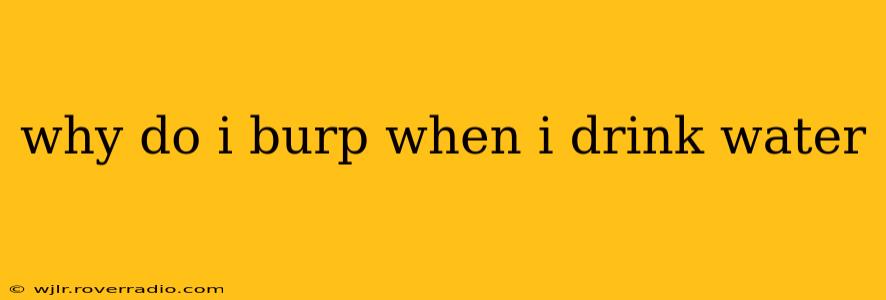Many people experience burping after drinking water, a seemingly innocuous act that can sometimes be surprisingly disruptive. While often harmless, understanding the reasons behind this common occurrence can help alleviate discomfort and address underlying issues. This comprehensive guide explores the various causes of water-induced burping and offers potential solutions.
What Causes Burping After Drinking Water?
The primary cause of burping, whether after drinking water or consuming other beverages, is the presence of excess air in the digestive system. This air becomes trapped in the stomach and is then released through the esophagus, resulting in a burp. Several factors can contribute to this air ingestion when drinking water:
-
Drinking too quickly: Gulping water rapidly increases the likelihood of swallowing air along with the liquid. The faster you drink, the more air you're likely to ingest.
-
Carbonated water: The carbon dioxide bubbles in carbonated water naturally release gas, leading to increased burping. This is a direct and expected consequence of consuming this type of beverage.
-
Underlying medical conditions: In some cases, persistent or excessive burping after drinking water can be a symptom of a more significant medical problem. These conditions include gastroesophageal reflux disease (GERD), hiatal hernia, or problems with the esophageal sphincter.
-
Anxiety or stress: Increased anxiety or stress can lead to increased swallowing of air, a habit known as aerophagia. This can manifest as more frequent burping, regardless of fluid intake.
-
Certain foods: Consuming certain foods before or after drinking water can contribute to increased gas production, indirectly leading to more burping.
Why Does Drinking Water Specifically Cause Burping?
While water itself doesn't directly cause burping, the manner in which it's consumed, combined with other factors, plays a significant role. As mentioned, the speed of consumption is key. If you're dehydrated and quickly gulp down a large glass of water, you are more prone to swallowing air. Furthermore, if you have underlying digestive issues, even a small amount of water can exacerbate symptoms, leading to burping.
How Can I Reduce Burping After Drinking Water?
Fortunately, there are several strategies you can employ to minimize burping after drinking water:
-
Drink slowly and deliberately: Take small sips, allowing the water to go down smoothly. This minimizes the amount of air swallowed with each sip.
-
Avoid carbonated water: If carbonated water is the culprit, switching to still water is a simple solution.
-
Maintain good posture: Slouching can compress the stomach and increase the likelihood of air becoming trapped. Sitting or standing upright while drinking helps.
-
Mindfulness techniques: Practicing mindfulness and reducing stress can help minimize aerophagia, a common cause of excess air ingestion.
-
Consult a doctor: If burping is persistent, excessive, or accompanied by other symptoms like heartburn, chest pain, or difficulty swallowing, it's crucial to seek medical advice.
Is Burping After Drinking Water Harmful?
In most cases, occasional burping after drinking water is perfectly normal and not cause for concern. However, persistent or excessive burping could indicate an underlying health issue. If you're worried, consult your doctor for a proper diagnosis.
When Should I See a Doctor About Burping?
You should seek medical attention if your burping is accompanied by other symptoms such as:
- Persistent heartburn or acid reflux
- Chest pain
- Difficulty swallowing (dysphagia)
- Unexplained weight loss
- Persistent nausea or vomiting
These symptoms could point to more serious conditions requiring medical intervention.
Remember, while occasional burping after drinking water is usually harmless, persistent or concerning symptoms warrant a visit to your healthcare provider. They can diagnose the underlying cause and recommend the appropriate treatment.
